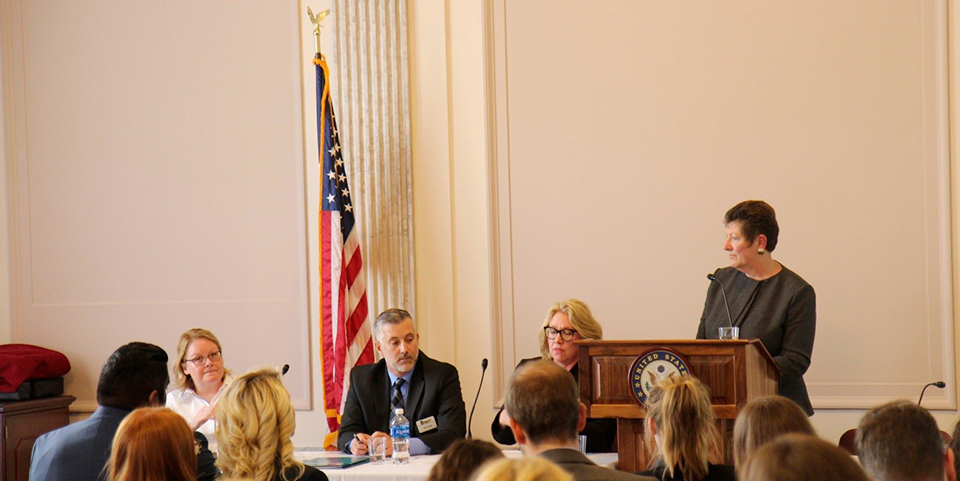09 Nov2017
By Zachary VanHouten
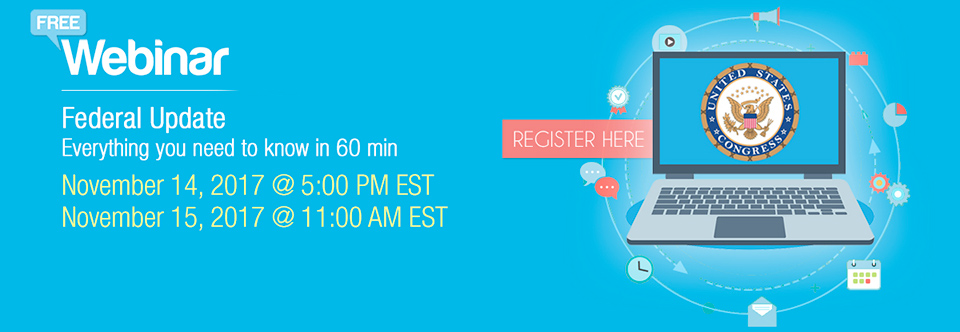
As the tax reform debate wages on in Congress, and as many other items linger on the agenda, there is much to accomplish in Washington by the year’s end. Many of the items will have an impact on the education community. Let AACTE help unpack and process some of the latest developments for you by joining our free, members-only November and December Federal Update webinars.
To accommodate busy end-of-year schedules and various time zones, AACTE offers each webinar at two different dates and times. Click on your preferred date/time below to register.
08 Nov2017
By Deborah Koolbeck
Last week Chairman Kevin Brady (R-TX) of the U.S. House of Representatives Committee on Ways and Means introduced a tax reform bill, H.R. 1, The Tax Cuts and Jobs Act, and scheduled the markup to start November 6 and continue until the work is completed. This process was initiated via reconciliation through the Fiscal Year 2018 budget resolution.
Prior to the markup beginning, Brady offered a manager’s amendment making changes to the original bill, and the markup (watch it live and view additional resources here) allows committee members to offer amendments.
02 Nov2017
By Zachary VanHouten
Panelists Ruth Neild (Director, Philadelphia Education Research Consortium), Jon Graft (Superintendent/CEO, Butler Tech, OH), and Carri Risner (Chef Instructor & Lead Teacher, Columbia Area Career Center, MO) participate in a Q & A session with moderator Elyse Eidman-Aadahl (Executive Director, National Writing Project) during a briefing October 26 in Washington, DC. Photo courtesy of ACTE.
A briefing hosted last week by the National Writing Project and the Association for Career & Technical Education (ACTE) highlighted some of the unique challenges facing career and technical education (CTE) teachers, calling attention to their need for better training and support as they enter the classroom.
Panelists at the briefing emphasized that many CTE teachers are career changers and lack the support and pedagogical preparation of a more traditionally trained educator. Describing the acclimation of these teachers to the classroom and the skills they need to acquire on the job as “drinking water from a fire hose,” panelists called for targeted professional development to help career-changing CTE teachers bridge the gap between their technical knowledge and the academic and pedagogical skills they need to succeed as educators. The speakers also called on policy makers to invest in supports for CTE educators to help these programs ensure their students obtain the skills that meet the needs of a growing job market.
26 Oct2017
By Zachary VanHouten

If you missed this week’s member-exclusive AACTE Federal Update webinar, the recording is now available to view in AACTE’s Advocacy Center (scroll down to the “Federal Update Webinars” box).
With so much on the congressional agenda, it is tricky, but crucial, for advocates to stay informed. The AACTE Federal Update webinar brings you up to speed on the latest developments. It’s also a great learning opportunity for other faculty at you institution – as well as your students! – so we encourage you to share the recording with them.
20 Oct2017
By Jemima Cabedo
In 2014, the University of North Carolina at Greensboro (UNCG) received a federal Teacher Quality Partnership grant for a proposal called Transforming Teaching through Technology (TTtT), winning Year 1 funding of nearly $1.7 million, renewable for up to 5 years. Now, as the partners move into their fourth year of grant-funded collaboration, I asked Principal Investigator and Project Director Christina O’Connor for an update on their work and what it takes to secure continued funding from the U.S. Department of Education year after year.
The partnership among UNCG, Guilford County Schools, and Winston-Salem/Forsyth County Schools aims to prepare 300 teacher candidates per year with the knowledge, skills, and dispositions to incorporate technology to promote academic learning for all students. The idea is to produce teachers who can embed technology and hands-on, problem-based instruction across all content areas. By approaching this work through partnerships, O’Connor noted, the strategies and lessons benefit not only preservice teachers but also the school-based educators and UNCG faculty.
16 Oct2017
By Zachary VanHouten
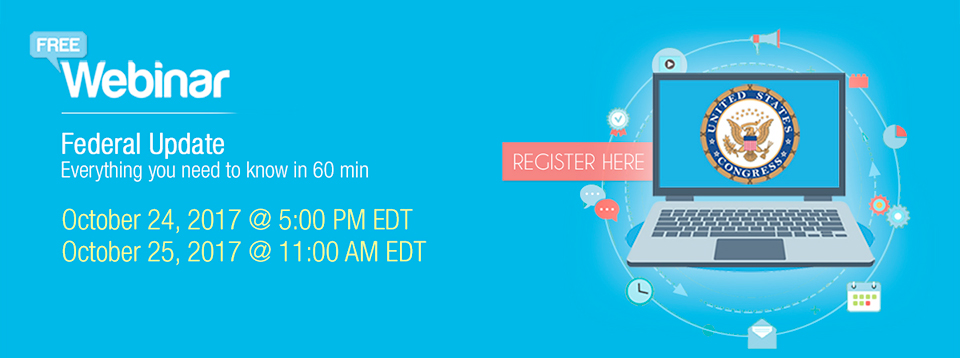
Education funding is at risk of devastating cuts if Congress cannot reach a budget deal that raises the caps on federal spending for Fiscal Year 2018. Deferred Action for Childhood Arrivals (DACA) reform, tax reform, the Children’s Health Insurance Program, and reauthorization of the Higher Education Act (HEA) are all items vying for attention on an overcrowded congressional agenda.
With so many issues facing Congress, the need for the profession to stay informed is more important than ever. To keep up to date with all the latest information, please join AACTE for one of the October Federal Update webinars.
16 Oct2017
By Zachary VanHouten
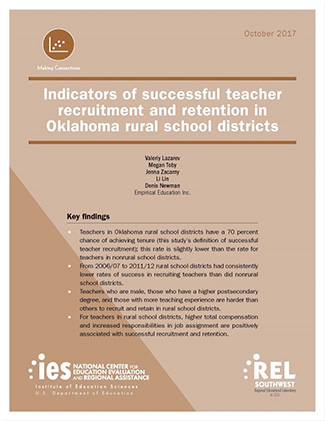
A new study from the Institute of Education Sciences (IES) Regional Educational Laboratory Southwest has reaffirmed many of the challenges related to recruiting and retaining educators in rural areas. The report, Indicators of Successful Teacher Recruitment and Retention in Oklahoma Rural School Districts (download PDF here), examines data spanning a decade in Oklahoma districts, more than 70% of which are rural.
The analysis finds that two key influences on teacher retention are compensation and teachers’ level of responsibility at their school. Numerous other factors affecting retention are catalogued in the appendices of the report, organized into categories of teacher, district, and community-based variables. Educator preparation programs that collaborate with rural districts may want to review the study’s findings for insights that might be applied to their own local challenges.
16 Oct2017
By Jane E. West
The American Council on Education, the major coordinating association for our nation’s colleges and universities, is leading the Protect Dreamers Higher Education Coalition, of which AACTE is a member. The coalition is coordinating a week of advocacy efforts beginning today, October 16, and has developed a website providing multiple resources related to Dreamers, including fact sheets and talking points, which can be used by individual campuses for advocacy.
In addition, the coalition is leading a letter that your institution can sign on to – but time is tight. The deadline is Wednesday, October 18, at noon EDT. To have your institution sign on to the letter, please reach out to your president’s office as well as your government relations staff. Find the instructions here.
29 Sep2017
By Deborah Koolbeck

As Congress returned from August recess, its agenda included a laundry list of items, and it is shaping up to be a very busy fall on Capitol Hill. Budget and appropriations, hurricane relief, the Deferred Action for Childhood Arrivals program, Higher Education Act reauthorization, and tax reform are just some of the issues that will fill the congressional calendar. For many of these topics, the voice of the education profession will be an important perspective for your members of Congress to hear.
Follow these three steps to ensure your constituent voice is heard:
26 Sep2017
By Zachary VanHouten
As part of continued efforts to provide relief for hurricane-affected regions, the U.S. Department of Education this week issued guidance to outline flexibility in reporting deadlines, grant-funded activities, continuity planning for disrupted programs, and fiscal management efforts. This guidance applies to state and local education agencies, Bureau of Indian Education-funded schools, postsecondary institutions, and other Department grantees.
Institutions affected by the recent hurricanes are highly encouraged to review the guidance, particularly if your program receives funding from a federal grant, receives federal student financial aid, or if you have other general questions regarding postsecondary education relief.
19 Sep2017
By Todd Alan Price
This month’s members-only Federal Update webinars are today and tomorrow, September 19 and 20 – or just view the recording in our archive if you miss them! The views expressed in this post do not necessarily reflect the views of AACTE.
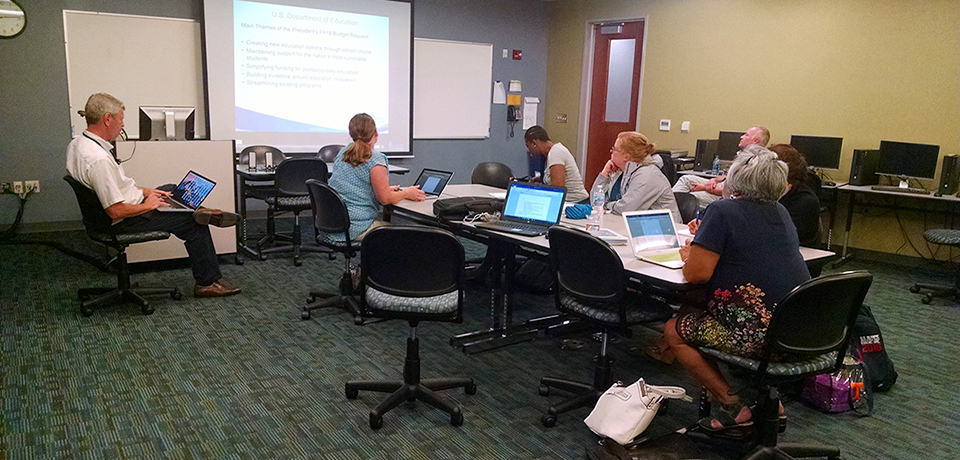
Over the summer of 2017, I integrated a valuable new asset into my doctoral-level Critical Policy Analysis class: advocacy resources from AACTE. From the members-only webinars to downloadable advocacy guides, these materials informed my students’ discussion of policy items pertinent to not only Illinois but the nation at large. They also provided current, practical information and tools for students to become more engaged in advocacy outside of class.
15 Sep2017
By Zachary VanHouten
By October 2, the Institute for Education Sciences (IES) is seeking input from the field on its requirements related to efficacy, replication, and effectiveness studies.
The impetus of the feedback request follows recommendations provided from a technical working group that was assembled in October 2016. IES seeks to understand whether the current Goals 3 and 4 (out of its full list of five) are meeting the needs of the field or whether modifications would be beneficial to replication and effectiveness studies. Goal 3 addresses efficacy and replication studies, and Goal 4 supports independent evaluation of prior efficacy studies.
12 Sep2017
By AACTE
On September 6, AACTE President/CEO Lynn M. Gangone issued the following statement regarding the Trump Administration’s ruling on the Deferred Action for Childhood Arrivals (DACA) program:
“The decision by President Trump yesterday to end the DACA policy leaves the plight of these individuals – who are integrated into our schools, our institutions of higher education, our workforce, and our communities – in the hands of the Congress.
11 Sep2017
By Zachary VanHouten
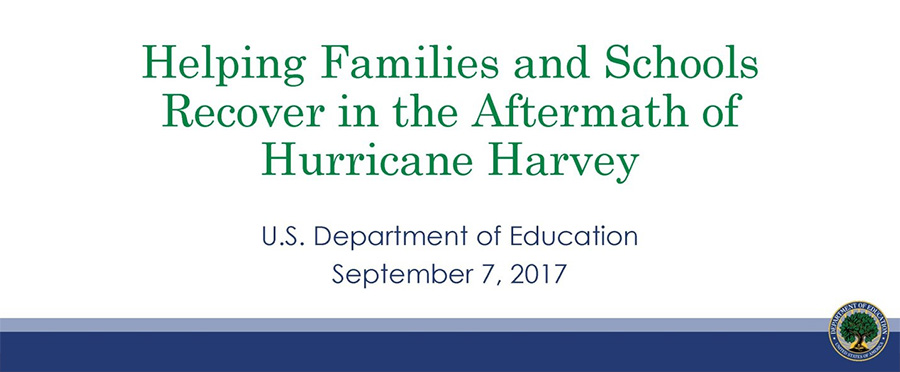
The U.S. Department of Education (ED), along with relevant federal and state agencies, hosted a webinar last week to provide emergency-response resources to districts and schools serving hurricane-affected regions.
Officials on the webinar included representatives from ED, the National Center for Homeless Education (NCHE), the Federal Emergency Management Agency (FEMA), and state education officials in Texas, Louisiana, and Florida. The webinar largely focused on the requirements in the McKinney-Vento Homeless Assistance Act, which outlines the procedures for identifying homeless students and the resources schools must make available to homeless students.
08 Sep2017
House and Senate Move on Education Funding Bills
By Deborah Koolbeck

Congress returned from August recess and hit the ground running on its work funding the federal government as the September 30 deadline looms.
U.S. House of Representatives Action
You might recall that the House passed four appropriations bills as a single package at the end of July. The House determined it would move the eight remaining appropriations bills to the floor as a single package – including the Labor, Health and Human Services, Education, and Related Agencies (Labor-H) bill – immediately after August recess. A call for amendments went out in early August.








